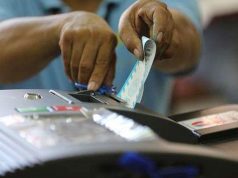Below-average holiday boost seen in fast-moving consumer goods sales

THE surge in fast-moving consumer goods (FMCG) sales during the holidays will be lower than the usual 20% seen in previous years, a market research company said.
Kantar Worldpanel Division Philippines General Manager Marie Anne Lezoraine said that rising unemployment and the continued rise of coronavirus cases has kept the FMCG sector from fully recovering.
Kantar cited reduced shopper mobility, limited outlet operations due to the quarantine, limited consumer purchasing power, and uneven availability of products in stores.
Ms. Lezoraine said in a briefing Wednesday that Philippine consumer spending on FMCG declined significantly on a per buyer basis well as by frequency of consumption during the strictest portion of the lockdown. Spending per trip, on the other hand, rose initially.
“Initially people spent more on each occasion — in the very first period of ECQ (enhanced community quarantine), and that is because people stocked up on the essentials,” she said.
“But over time the basket value came back to pretty much the same level to how much it was just before ECQ.”
The restrictions during the strictest part of the lockdown had a major impact on consumption because Filipino buyers are frequent FMCG shoppers, making purchases almost every day.
While she said predictions are difficult, Kantar analyzed whether Filipinos are likely to save up or purchase more goods during the holidays.
“We do have evidence that shoppers have cut on their FMCG expenditure,” she said.
She said consumers in the higher socio-economic classes increased their FMCG purchases in the first nine months, spending mainly on food, while those in lower socio-economic classes cut their expenditures, especially on beverages, home, and personal care items.
Kantar is also seeing some stabilization in purchases, which may improve if coronavirus cases do not rise significantly and mobility restrictions are relaxed.
On average, the boost to FMCG sales is 20% during the holidays, with more than half of households receiving FMCG gifts, Kantar said.
With less restrictive lockdown policies in place, Ms. Lezoraine said she believes there will be an increase in FMCG expenditures for Christmas.
“I think it’s likely to be a lower level than we’ve seen in previous years because budgets are probably more limited, but we do see the desire from shoppers to still celebrate Christmas,” she said.
Around 30% of consumers surveyed by Kantar remain “very worried” about their financial status over the next six months. But 80% said they are willing to spend more to celebrate at home during special occasions, including Christmas.
“We really see people wanting to celebrate Christmas, but most likely quite different than any previous year,” Ms. Lezoraine said. — Jenina P. Ibañez



